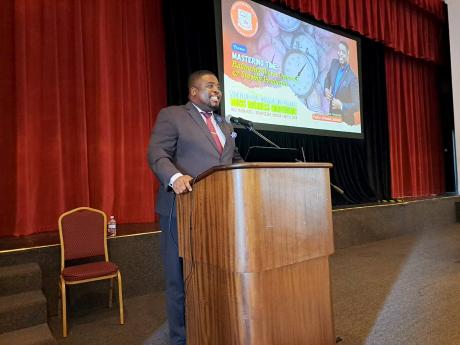Technology can be a boon or a bane, warns I Believe ambassador
WESTERN BUREAU:
Motivational speaker Jermaine Johnson, the I Believe Initiative Ambassador for the governor general’s Programme for Excellence, is urging young people to be mindful of how their use of social media could lead to an addiction that eats into their time management and erodes their productivity.
Johnson sounded the warning on Tuesday while addressing the Annual Business Conference of the Montego Bay Community College’s Faculty of Business and General Studies at the Half Moon Hotel’s Conference Centre in Rose Hall, St James. The conference was held under the theme ‘Mastering Time: Balancing Work Demands and Staying Productive, Version 2.0.’
“Technology can be both a boon and a bane in our quest to master time. On one hand, it offers tools that can enhance our productivity, such as digital calendars, communication platforms, and automation tools. On the other hand, it also presents distractions like social media, endless notifications, and the temptation to be constantly connected and instantly updated,” said Johnson.
“It is up to us to harness technology wisely, using it to streamline our work without allowing it to encroach upon our personal time,” Johnson added. “When we are busy watching videos for influencers and ranking them in the top tiers so they can get the millions of views, you know what they get for it? ‘Chi-ching-ching.’ And you know what you get for it? Not a thing-thing.”
Johnson cited a 2023 study which outlined that American teenagers spend more than four hours’ worth of daily time on social media.
“Research done by Statista Research Department points out that according to a 2023 survey conducted in the United States, teenagers spent an average of 4.8 hours on social media platforms every day. Overall, girls spent almost an hour more on social networks daily, with an average of 5.3 hours, compared to 4.4 hours for boys,” Johnson outlined.
“This is a whole lot of time, and the recommendation for sleep is six to eight hours. Imagine you spend six hours sleeping, some hours eating and bathing and doing other things, and yet you find five hours to go on social media. You have to make sure you don’t fall into this trap,” Johnson continued.
The issue of social media addiction has been a long-standing cause for concern, including in Jamaica, where Choose Life International’s founder Dr Donovan Thomas called on parents during a Gleaner Editors’ Forum in September 2019 to be vigilant of their children’s social-media usage. That call came on the heels of children being instructed on how to commit suicide through the infamous Momo Challenge in 2018.
UNICEF survey
A survey conducted by the United Nations Children’s Fund (UNICEF) through U-Report Jamaica in 2018 revealed that 86 per cent of respondents believed social media could be a potentially toxic environment. The survey also reported that 64 per cent of respondents in the zero to 14 age group and 47 per cent of the 15 to 19 age cohort felt that social media affected their mental health.
During a Press Association of Jamaica forum in January 2023, the Office of the Children’s Advocate called for parents to better monitor their children’s use of the Internet, citing at that time a 2015 report that more than 50 per cent of children had engaged online with persons they had never met before.
In the meantime, Johnson told Tuesday’s conference that there is a stark difference between how social-media platform TikTok is used in its home country of China and how it is used in the Western world.
“Where they created TikTok over there in China, they have a different algorithm that directs TikTok than what is in the Western world. When you watch TikTok over on our side of the world, you see all the ‘kin teeth’, and some of them are just outright hilarious, and that’s good. You must have little light-hearted moments. But when their children watch TikTok over there, you know what they see? Children who are stealing up the world, who are doing well in the sciences, technology, engineering, arts, and mathematics,” said Johnson.
“When the children go on TikTok and watch these things, you know what it does? It inspires them to step up their game. But what are we over here doing? ‘No, no, no, that will never happen.’ You are to take charge of your time,” Johnson added.

